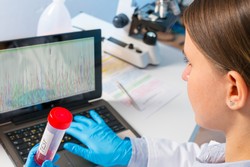The complete picture of DNA in routine healthcare
The surge in new genetic technologies and their rapid introduction means that many tests have not been fully validated. The implementation of whole genome sequencing (WGS) will only succeed if we solve current issues regarding ethics, interpretation of data and quality of whole genome sequence analysis as opposed to targeted gene analysis. The 3Gb-TEST(opens in new window) (Introducing diagnostic applications of ‘3Gb-testing’ in human genetics) project has brought together a consortium of experts to assess the situation and draw up quality assessment schemes and guidelines. Researchers first organised workshops and meetings to address the most critical parts of sequencing the total human genome (the 3Gb-Test as coined by the project). The focus lay on wet lab innovations such as DNA extraction, boinformatics' tools, transfer of WGS to the clinic, health technology assessment and training. For WGS, the resulting 3Gb-TEST roadmap has pinpointed three major gaps – lack of knowledge in interpretation of non-coding areas of the genome, the need for trustworthy, accurate clinical, diagnostic and prediction tools as well as staff training. Guidelines for new sequencing techniques must also be geared towards WGS. Recommendations in relation to diagnosis include bridging the gap between whole exome sequencing – where all expressed genes are sequenced – and WGS, which includes the non-coding regions. This scenario would allow exome sequencing where all the gene deletions and duplications are included when economically feasible. Another reservation is that sharing of gene data with the patient has not been implemented yet. Issues regarding ethics and related standards also have to be addressed. Looking at the global situation in Europe, capacity building is crucial in this interim period before the widespread use of the 3Gb-Test in healthcare. The development of next generation sequencing (NGS) techniques and WGS has been analysed and planned for its integration into everyday healthcare. Above all, it is crucial that patients and their families receive correct advice and appropriate management. As a follow-up to 3Gb-TEST, a new initiative, a Cost Action project proposes to build a network to guide scientific developments. Enabling NGS technology, this promises to unite leading stakeholders in a single pan-European network.







